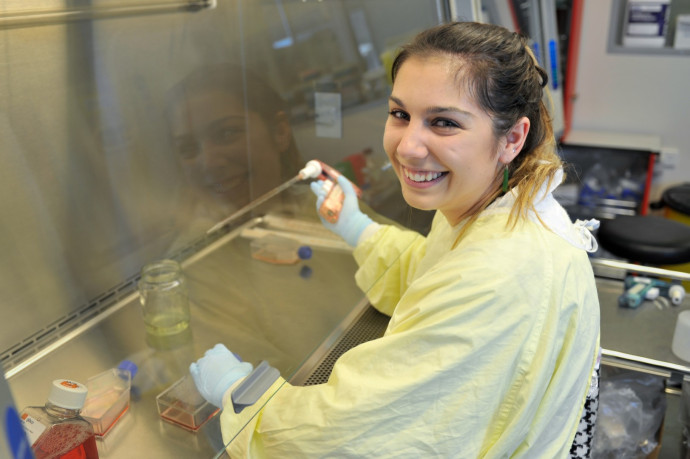2025 Te Kopunui Māori Research Award: Ensuring Indigenous people are included in biomedical datasets and research

Helena Abolins-Thompson (Ngāti Toarangatira, Ngāi Tahu), of Ōtākou Whakaihu Waka – the University of Otago (Wellington), has won Te Kōpūnui Māori Research Award for her research which integrates community collaboration and Indigenous worldviews into an ethical framework for biomedical research, promoting equitable health outcomes by ensuring representation of Indigenous people in scientific datasets.
Helena’s most recent study focused on cancer and cardiovascular diseases in Māori women. She developed culturally informed practices to obtain samples of human tissues from these wāhine Māori. She created 3D models of tumour organoids from some samples, to enable screening of potential therapies for cancers. RNA from cells in other samples was sequenced, using advanced next-generation techniques, to aid development of personalised medicines for Māori women that target the relevant genes.
One of the aims of this research was to highlight how standard healthcare practices can be adapted to be culturally appropriate through use of tikanga. Helena is redefining translational research with and for Indigenous communities and connecting to Indigenous research networks around the world.
“Both cancer and cardiovascular diseases are priorities in the Māori health space. However, the representation of Māori in modern scientific data that informs treatment options is limited,” Helena explains.
“The goal of this work was, therefore, to increase Māori representation in advanced scientific datasets that inform treatment, particularly in the context of personalised treatment options, as just one way of working towards equitable health outcomes for Māori.”
Helena and her team aimed to integrate culturally responsive health research with modern biomedical tools to ensure this work was advancing health equity in a mana-enhancing way.
“I was really inspired by the chance to work alongside my own community, with my whanaunga from Ngāti Toa Rangatira being essential to the success of this project.”
“I think everyone who has whakapapa Māori has heard the numbers and the statistics surrounding Māori health outcomes.”
She says this work gave her an opportunity to “flip the narrative” and look at how to improve health outcomes and how well health research works for Māori communities.
Helena describes her journey as “a bit of a rollercoaster”.
“This work is deeply tied to my community and to me personally, which has made it incredibly rewarding but also challenging in unexpected ways.”
“What got me through was the unwavering support of the people around me, who backed me, encouraged me to grow, and helped me build confidence moving between Te Ao Māori and Western research systems,” she says.
A turning point for Helena was being able to present her work back to her iwi and community.
“It was the first moment where I allowed myself to think, ‘maybe I am working my way toward being an expert in this space.’”
She hopes her mahi shows that it’s possible to do ethically grounded research in and with our communities.
“In Aotearoa, we’re in a unique position– we can do cutting-edge science that directly benefits people here, but to do it responsibly requires genuine buy-in from both tangata whenua and tangata Tiriti.
“If there’s one takeaway, it’s that research doesn’t have to choose between being rigorous and being community-driven – it can, and should, be both.”
On the award, Helena says: “It’s been an endeavour that has challenged me both personally and professionally, so this award is incredibly special.”
“This work would not exist without all of the incredible people who have helped and contributed along the last few years.”
She’d like to thank: Te Rūnanga o Toa Rangatira, particularly Dr Te Taku Parai; her governance group Dr Megan Leask, Dr Jake Aitken, and Dr Mairarangi Haimona; her supervisory group Associate Professor Kirsty Danielson, Dr Claire Henry, Dr Bridget Simonson, and Dr Megan Leask; Hei Āhuru Mōwai and the Cancer Society of New Zealand Te Kāhui Matepukupuku o Aotearoa, particularly Dr Kimiora Henare and Dr Nicole Stanton, as well as the University of Otago Wellington, and the Broad Institute in Boston.
“There has been a whole community of researchers and individuals behind this kaupapa, for which I will always be appreciative.”
“I also have to thank my friends and family who have supported me throughout this journey. I wouldn’t have been able to complete this endeavour without all their support and love, and I feel very lucky to have them guiding me.
Te Kōpūnui Māori Research Award:
For an early-career Māori researcher for innovative research with the potential for significant impact.
Citation:
To Helena Jean Abolins-Thompson for demonstrating how Indigenous worldviews and community collaboration can enhance molecular biology studies, ensuring ethical, culturally responsive, and equitable representation in scientific data.
